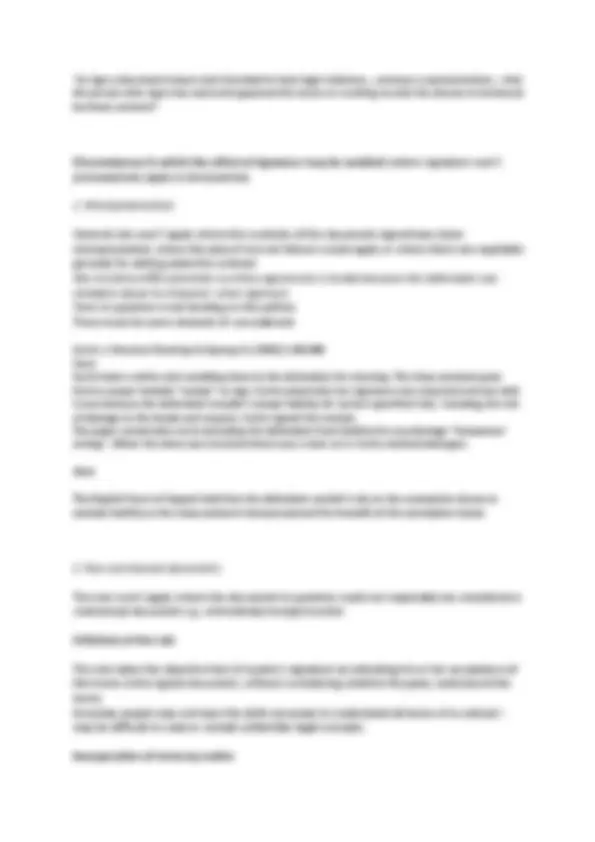




Study with the several resources on Docsity

Earn points by helping other students or get them with a premium plan


Prepare for your exams
Study with the several resources on Docsity

Earn points to download
Earn points by helping other students or get them with a premium plan
Community
Ask the community for help and clear up your study doubts
Discover the best universities in your country according to Docsity users
Free resources
Download our free guides on studying techniques, anxiety management strategies, and thesis advice from Docsity tutors
The concept of express terms in contracts, discussing five key matters to consider when resolving disputes. It delves into the objective approach of the courts, the significance of a party's intention, and the role of signatures and notice in contractual agreements. The document also covers the l'estrange v graucob case and its impact on the rule of signature, as well as circumstances where the effect of signature may be avoided.
Typology: Lecture notes
1 / 4

This page cannot be seen from the preview
Don't miss anything!



Week 1 & 2 – Express Terms Disputes arise over the terms of a contract Five matters to consider when attempting to resolve disputes:
Written terms and the effect of signature Rule in L’Estrange v Graucob General rule – a person who signs a contractual document will be bound by the terms in that document, regardless of whether he or she has read and understood those terms ( L’Estrange ) and no matter whether the terms are unusual or onerous ( Toll v Alphapharm ) The act of signing a document is seen as a willingness to be bound by those terms L’Estrange v Graucob Ltd [1934] 2 KB 394 Facts Ms L’Estrange purchased a cigarette vending machine from F Graucob Ltd. Ms L’Estrange signed a “Sales Agreement” which contained the terms of sale. When the machine was delivered, it didn’t work satisfactorily. She bought action for damages for breach of an implied warranty that the machine was reasonably fit for purposes for which it was required. There was a clause in the sales agreement which stated that any express or implied condition, statement or warranty not stated is excluded, which the defendant relied upon Judgment The trial judge had relied upon the ticket cases to argue that notice had to be given of the terms of the document (here the exclusion clause). However, this is not a ticket case and the law applicable is not the same. Here the document involved is signed. When the document is signed it is immaterial that a party has not read it and does not know if its contents. He is bound unless there has been fraud or misrepresentation. As there was no fraud or misrepresentation here the Plaintiff was bound by the exclusion clause. Toll (FGCT) v Alphapharm Pty Ltd [2004] HCA 52 Facts Toll entered into a contract with Richard Thomson (acting for Alphapharm) to store and transport goods being imported for Alphapharm. It was alleged Finemores performed this contract negligently, causing loss to Alphapharm. Finemores sought to escape liability by relying upon an exclusion clause in the contract with Richard Thomson Issue: must the defendant do what is reasonably necessary to give notice to unusual terms Held When signing a document, you are making a representation that you have read and understand the contents of the terms contained in the contract and that there was no reason to depart from the general rule. As a result, the terms and conditions formed part of the contract for the storage of goods “the general rule... a person who signs a document which is known by that person to contain contractual terms... is bound by those terms, and it is immaterial that the person has not read the document”
A business that doesn’t rely on signed contracts in its dealings may attempt to incorporate the terms it wants to govern the transaction through the device of notice Adequate notice before the contract is made makes those terms binding even though no document has been signed Whether terms are to be incorporated into a contract depends on two issues: